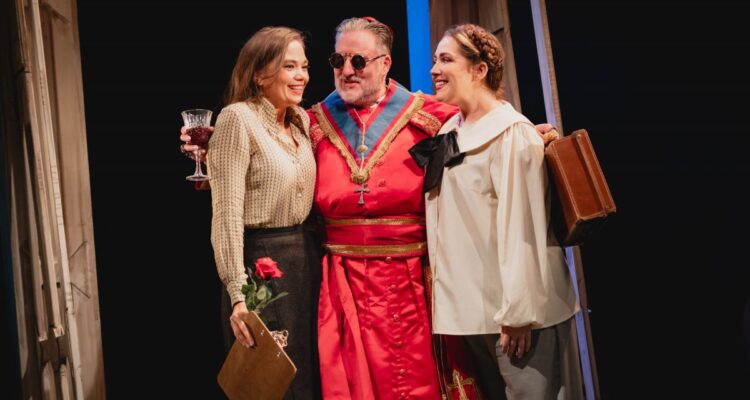Giovanni Paisiello is not a name remembered much now, but in the later eighteenth century his comic operas dominated stages across Europe. After seeing this fascinating production of The Fabulist you can see why. His music has an accessible, easy, melodic charm, unfussy and deft orchestral underpinning, and an ability to depict and project character through individual arias. Anyone coming to this musical world immediately sees anticipations of Mozart and Rossini and is reminded of how much those two composers built on Paisiello – to the extent that Rossini actually reused the libretto of The Barber of Seville in order to surpass his predecessor’s earlier version.
Many of Paisiello’s works were written for royal events at the behest of Catherine the Great and Napoleon, and the settings and trappings do not translate to the modern world. Cue James Farwell’s intervention to rescue one of these efforts and subsitute a new story and libretto in modern English. Starting from the original title of ‘The Imaginary Astrologer’ he relocates the action to Mussolini’s Italy at the time of the Concordat of 1929, which sought to bind together the institutions of church and state. We are in a movie studio in Tuscany where two sisters, Cassandra and Clarice, are engaged in making a film about the Fall of Troy. A magician (or fabulist, as he prefers to be called) and his sidekick sign up as extras and then develop an amorous interest in the two sisters. But they have to reckon with two authority figures – the sisters’ father, Count Petronius, a scientist, and their uncle, the worldly Cardinal Bandini.
Farwell wants to take us in a serious as much as a comic direction. He would like us to focus on the nature of magic and illusionism and how far there are different paths to truth than are recognised by science and religion. While this is an intriguing theme in its own right, it does overburden the first half of the show with ‘telling’ rather than ‘showing’. The cast and production are at their best when they are playing the material for dexterous verbal and visual comedy. To that extent the second half is an unmitigated pleasure because it is more free-wheeling in a purely comic vein that anticipates the world of Figaro and Cosi fan tutte.
High praise belongs to the production values. David Shields presides over a delightfully cluttered set that dives deep into the illusionism of the film-set scenario; and he also contributes a parade of zany and inventive costumes and disguises for the many moments of deception. The magic tricks themselves are very convincing, helped by the fact that Dan Smith, in the lead role, is himself a member of The Magic Circle. A small orchestra of five players, perched in a balcony, does admirable justice to the score, with plenty of independent moments to shine under the leadership of Varia Doletskaya-Pidgen.
Clearly everyone on stage is having a lot of fun, and it is a great strength that all the cast are fine comic actors as well as singers. Perhaps the standout performance comes from Reka Jonas as Clarice, the daughter who has seen off dozens of suitors. She has a dazzling top range which is put to the test in the score, but also, like Susanna in Figaro, she has to guide the action along in the second half as the only person aware of most of the machinations. As her sister, Cassandra, Lily de la Haye has less to do, but she offers a robust contrast in voice and acting. The two of them also blend together elegantly in their several duets. As noted, Dan Smith is more than equal to the technical requirements of the title role; but he is also a charming comic and proficient singer, despite some moments of vocal strain. As Pupupini, his assistant/mentor, Constantine Andronikou offers a droll and ironic counterfoil, and takes his solo moments well. The forces of bemused authority, Petronius and Bandini, are all the more effective and funny for being played seriously by James Paterson and Stuart Pendred.
All-in-all this is a charming and very worthwhile evening. Perhaps a little longer than it needs to be, but it is very heartening to have this music revived, and played with such collective skill and commitment.
Music: Giovanni Paisiello
Libretto: James Farwell
Director: John Walton
Cast: Constantiner Andronikou, Lily de la Haye, Reka Jonas, James Paterson, Stuart Pendred, Dan Smith
Photo Credit: Mark Senior
2 hrs 30 mins with interval
Until 21 September 2024

